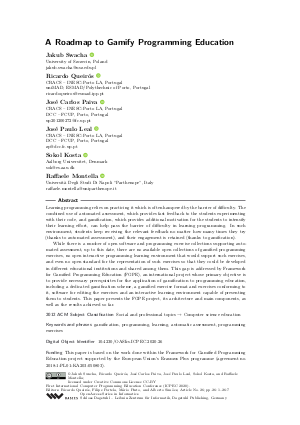A Roadmap to Gamify Programming Education
Authors
Jakub Swacha  ,
Ricardo Queirós
,
Ricardo Queirós  ,
José Carlos Paiva
,
José Carlos Paiva  ,
José Paulo Leal
,
José Paulo Leal  ,
Sokol Kosta
,
Sokol Kosta  ,
Raffaele Montella
,
Raffaele Montella 
-
Part of:
Volume:
First International Computer Programming Education Conference (ICPEC 2020)
Part of: Series: Open Access Series in Informatics (OASIcs)
Part of: Conference: International Computer Programming Education Conference (ICPEC) - License:
 Creative Commons Attribution 3.0 Unported license
Creative Commons Attribution 3.0 Unported license
- Publication Date: 2020-06-15
File

PDF
OASIcs.ICPEC.2020.26.pdf
- Filesize: 430 kB
- 7 pages
Document Identifiers
Subject Classification
ACM Subject Classification
- Social and professional topics → Computer science education
Keywords
- gamification
- programming
- learning
- automatic assessment
- programming exercises
Metrics
- Access Statistics
-
Total Accesses (updated on a weekly basis)
0Document
0Metadata
Abstract
Learning programming relies on practicing it which is often hampered by the barrier of difficulty. The combined use of automated assessment, which provides fast feedback to the students experimenting with their code, and gamification, which provides additional motivation for the students to intensify their learning effort, can help pass the barrier of difficulty in learning programming. In such environment, students keep receiving the relevant feedback no matter how many times they try (thanks to automated assessment), and their engagement is retained (thanks to gamification). While there is a number of open software and programming exercise collections supporting automated assessment, up to this date, there are no available open collections of gamified programming exercises, no open interactive programming learning environment that would support such exercises, and even no open standard for the representation of such exercises so that they could be developed in different educational institutions and shared among them. This gap is addressed by Framework for Gamified Programming Education (FGPE), an international project whose primary objective is to provide necessary prerequisites for the application of gamification to programming education, including a dedicated gamification scheme, a gamified exercise format and exercises conforming to it, software for editing the exercises and an interactive learning environment capable of presenting them to students. This paper presents the FGPE project, its architecture and main components, as well as the results achieved so far.
Cite As Get BibTex
Jakub Swacha, Ricardo Queirós, José Carlos Paiva, José Paulo Leal, Sokol Kosta, and Raffaele Montella. A Roadmap to Gamify Programming Education. In First International Computer Programming Education Conference (ICPEC 2020). Open Access Series in Informatics (OASIcs), Volume 81, pp. 26:1-26:7, Schloss Dagstuhl – Leibniz-Zentrum für Informatik (2020)
https://doi.org/10.4230/OASIcs.ICPEC.2020.26
BibTex
@InProceedings{swacha_et_al:OASIcs.ICPEC.2020.26,
author = {Swacha, Jakub and Queir\'{o}s, Ricardo and Paiva, Jos\'{e} Carlos and Leal, Jos\'{e} Paulo and Kosta, Sokol and Montella, Raffaele},
title = {{A Roadmap to Gamify Programming Education}},
booktitle = {First International Computer Programming Education Conference (ICPEC 2020)},
pages = {26:1--26:7},
series = {Open Access Series in Informatics (OASIcs)},
ISBN = {978-3-95977-153-5},
ISSN = {2190-6807},
year = {2020},
volume = {81},
editor = {Queir\'{o}s, Ricardo and Portela, Filipe and Pinto, M\'{a}rio and Sim\~{o}es, Alberto},
publisher = {Schloss Dagstuhl -- Leibniz-Zentrum f{\"u}r Informatik},
address = {Dagstuhl, Germany},
URL = {https://drops.dagstuhl.de/entities/document/10.4230/OASIcs.ICPEC.2020.26},
URN = {urn:nbn:de:0030-drops-123136},
doi = {10.4230/OASIcs.ICPEC.2020.26},
annote = {Keywords: gamification, programming, learning, automatic assessment, programming exercises}
}
Author Details
Funding
This paper is based on the work done within the Framework for Gamified Programming Education project supported by the European Union’s Erasmus Plus programme (agreement no. 2018-1-PL01-KA203-050803).
References
- Bharat Adibhatla. Top 5 coding websites companies hire from, 2019. accessed on 20 Jan 2020. URL: https://analyticsindiamag.com/top-5-coding-websites-companies-hire-from/.
- Manal M. Alhammad and Ana M. Moreno. Gamification in software engineering education: A systematic mapping. Journal of Systems and Software, 141:131-150, 2018. URL: https://doi.org/10.1016/j.jss.2018.03.065.
- Yorah Bosse and Marco Aurélio Gerosa. Why is programming so difficult to learn? patterns of difficulties related to programming learning mid-stage. SIGSOFT Softw. Eng. Notes, 41(6):1–6, January 2017. URL: https://doi.org/10.1145/3011286.3011301.
- Guanzhong Chen. Dmoj, 2020. accessed on 20 Jan 2020. URL: https://dmoj.ca/.
- European Commission. Coding - the 21st century skill, 2018. accessed on 20 Jan 2020. URL: https://ec.europa.eu/digital-single-market/en/coding-21st-century-skill.
- Jaap Eldering, Nicky Gerritsen, Keith Johnson, Thijs Kinkhorst, and Tobias Werth. Domjudge, 2020. accessed on 20 Jan 2020. URL: https://www.domjudge.org/.
- FGPE Project Consortium. Framework for gamified programming education, 2018. accessed on 20 Jan 2020. URL: http://fgpe.usz.edu.pl.
- Google. Code with google, 2020. accessed on 20 Jan 2020. URL: https://edu.google.com/code-with-google/.
- Google. Google’s coding competitions, 2020. accessed on 20 Jan 2020. URL: https://codingcompetitions.withgoogle.com/.
- HackerRank. Hackerrank, 2011. accessed on 20 Jan 2020. URL: https://www.hackerrank.com/.
- European Coding Initiative. All you need is code, 2020. accessed on 20 Jan 2020. URL: http://www.allyouneediscode.eu.
- Kattis. Kattis, 2019. accessed on Jan 2020. URL: https://open.kattis.com/.
- José Paulo Leal. Mooshak, 2018. accessed on Jan 2020. URL: https://mooshak.dcc.fc.up.pt/.
- LeetCode. Leetcode, 2015. accessed on 20 Jan 2020. URL: https://leetcode.com/.
-
Ricardo Queirós and José Paulo Leal. PExIL: Programming exercises interoperability language. In Conferência Nacional XATA: XML, aplicaç~oes e tecnologias associadas, 9. ordfeminine, pages 37-48. ESEIG, 2011.

- Erik Scheffers, Tom Verhoeff, Stefan Geuns, Marijn Kruisselbrink, Paul Wagener, Robert Leenders, Iosif Macesanu, and Maikel Steneker. peach3, 2017. accessed on Jan 2020. URL: https://peach3.nl.
- J. Swacha, R. Queirós, and J. C. Paiva. Towards a framework for gamified programming education. In 2019 International Symposium on Educational Technology (ISET), pages 144-149, July 2019. URL: https://doi.org/10.1109/ISET.2019.00038.
-
Jakub Swacha. SIPE: A Domain-Specific Language for Specifying Interactive Programming Exercises. In Towards a Synergistic Combination of Research and Practice in Software Engineering, pages 15-29, Cham, Switzerland, 2018. Springer.

- Jakub Swacha, Ricardo Queirós, José Carlos Paiva, and José Paulo Leal. Defining requirements for a gamified programming exercises format. Procedia Computer Science, 159:2502-2511, 2019. Knowledge-Based and Intelligent Information & Engineering Systems: Proceedings of the 23rd International Conference KES2019. URL: https://doi.org/10.1016/j.procs.2019.09.425.
- TopCoder. Topcoder, 2001. accessed on 20 Jan 2020. URL: https://www.topcoder.com/.
- Maarten Vansteenkiste and Edward L. Deci. Competitively contingent rewards and intrinsic motivation: Can losers remain motivated? Motivation and emotion, 27(4):273-299, 2003. URL: https://doi.org/10.1023/A:1026259005264.
-
Tom Verhoeff. Programming task packages: Peach exchange format. International Journal Olympiads In Informatics, 2:192-207, 2008.

